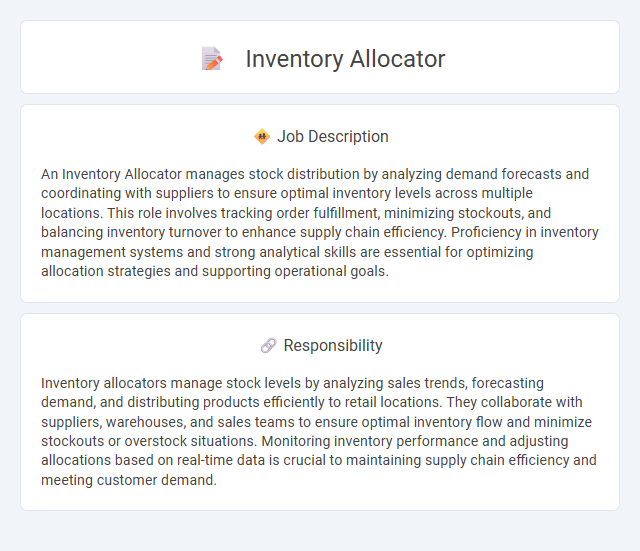
An Inventory Allocator manages stock distribution by analyzing demand forecasts and coordinating with suppliers to ensure optimal inventory levels across multiple locations. This role involves tracking order fulfillment, minimizing stockouts, and balancing inventory turnover to enhance supply chain efficiency. Proficiency in inventory management systems and strong analytical skills are essential for optimizing allocation strategies and supporting operational goals.
Individuals with strong organizational skills and attention to detail are likely suitable for an inventory allocator role, as the job requires managing stock levels accurately and efficiently. Those who thrive in dynamic environments and possess problem-solving abilities may find this position aligns well with their strengths. Conversely, people who struggle with multitasking or prefer less structured tasks might find the demands of this job challenging.
Qualification
Inventory allocator roles require strong analytical skills to manage stock levels, forecast demand, and optimize supply chain efficiency. Candidates typically need experience with inventory management software, proficiency in data analysis, and a solid understanding of logistics and warehouse operations. A background in supply chain management, business administration, or a related field enhances the ability to coordinate inventory distribution effectively.
Responsibility
Inventory allocators manage stock levels by analyzing sales trends, forecasting demand, and distributing products efficiently to retail locations. They collaborate with suppliers, warehouses, and sales teams to ensure optimal inventory flow and minimize stockouts or overstock situations. Monitoring inventory performance and adjusting allocations based on real-time data is crucial to maintaining supply chain efficiency and meeting customer demand.
Benefit
An Inventory Allocator likely improves supply chain efficiency by accurately distributing stock to meet demand, which reduces overstock and stockouts. This role probably contributes to cost savings through optimized inventory management and better forecast alignment. Efficient inventory allocation may also enhance customer satisfaction by ensuring product availability and timely delivery.
Challenge
Inventory allocator roles likely involve significant challenges related to balancing supply and demand across multiple locations while minimizing excess stock and shortages. Managing fluctuating market trends and unpredictable consumer behavior may increase the complexity of accurately forecasting inventory needs. The necessity to coordinate with various departments under tight deadlines might further contribute to the demanding nature of this position.
Career Advancement
Inventory allocator roles involve managing stock levels and optimizing supply chains to ensure efficient distribution and minimize shortages. Expertise gained in analyzing inventory data and coordinating logistics positions individuals for advancement into supply chain management or operations leadership roles. Mastery of inventory management software and strategic planning enhances opportunities for career growth and higher responsibility within retail and manufacturing sectors.
 kuljobs.com
kuljobs.com